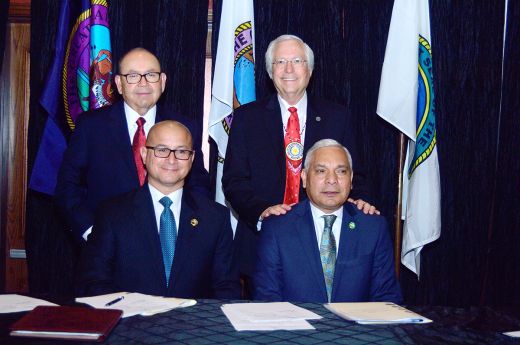Inter-tribal Council issues resolutions in support of Indian Country programs

This article appeared in the June 2018 edition of the Chickasaw Times
TULSA, Okla. – The Inter-tribal Council (ITC) of the Five Civilized Tribes unanimously passed nine resolutions May 1 calling for action on several issues critically important to Indian Country.
Leaders of the Chickasaw, Cherokee, Seminole, Muscogee (Creek) and Choctaw nations also heard from two guest speakers.
U.S. Rep. Markwayne Mullen, of Oklahoma’s 2nd District – who joins 4th District U.S. Rep. Tom Cole as the only Native Americans elected to public office nationally – said the federal government should respect tribal sovereignty and engage with tribes on a government-to-government basis. Rep. Mullen is a citizen of the Cherokee Nation; Rep. Cole is a Chickasaw citizen.
Oklahoma Superintendent of Public Instruction Joy Hofmeister also addressed ITC officials and participants saying she was pleased Oklahoma legislators addressed teacher pay and public education funding this year, but added much work remained.
“The budget makes us competitive regionally,” Superintendent Hofmeister said. “I would like to see Oklahoma become competitive nationally.”
Health, housing, educational opportunities and tribal sovereignty were among topics addressed by Governor Bill Anoatubby; Cherokee Chief Bill John Baker; Seminole Chief Greg Chilcoat; Muscogee (Creek) Chief James Floyd and Choctaw Chief Gary Batton.
Those topics also were addressed in resolutions passed by ITC members, who collectively represent approximately 750,000 Indian citizens. ITC is one of the most powerful political voices advocating for Native Americans and tribal governments in the nation.
Resolutions included:
- A call opposing proposed elimination of the Bureau of Indian Affairs’ Housing Improvement Program. The program, initiated in 1962, helps Native Americans with funds to repair, renovate and replace substandard housing. According to the ITC resolution, the program “serves the neediest of the needy who have substandard housing or no housing at all.”
- Support for funding of the Johnson O’Malley (JOM) program in the 2019 federal budget and urged Congress to pass JOM Supplemental Indian Education Program Modernization Act. Currently, only 278,000 students are served, when more than 798,000 qualify for books, fees and equipment not provided by public school districts. The 2018 budget only provided $15 million, while $42 million is needed for full funding.
- Tribes opposed the proposed elimination of the Indian and Native American Department of Labor Workforce Innovation and Opportunity Act funding. The Five Tribes have been operating labor and training programs for more than 40 years, assisting both youth and adults. Funds are needed to provide training and skills so Natives may enter and retain good employment with “self-sustaining wages and benefits.”
- Tribes support government-to-government relationships with the federal government to ensure protection of tribal sovereignty. At issue is the U.S. Health and Human Services Department fulfilling the federal government’s trust responsibilities relating to provision of health care to American Indians and Alaska Natives.
- Support for Oklahoma Senate Bill 86 which protects local and tribal interests when considering bypass development. The tribes seek advanced consultation with the Oklahoma Department of Transportation when considering any bypass development that might impact tribal property. The resolution urges passage of the legislation currently in the Oklahoma Senate.
- Opposition to proposed elimination of funding for low income home energy assistance. Thousands of Five Civilized Tribes citizens are provided heating and cooling assistance through the program. Rural areas of Indian Country would particularly be adversely impacted. The ITC called on Congress to protect funding for programs that provide basic needs for tribal children, elders and individuals with disabilities.
- Support for Oklahoma House Bill 3076 which would place an American Indian survivor of domestic abuse on the Oklahoma Domestic Violence Fatality Review Board. It was noted by the ITC, Native women face the highest rates of violence of any ethnic group. Tribes are dedicated to providing assistance to domestic and sexual violence advocacy programs throughout Oklahoma.
- Resistance to changes in the Indian Health Service contract support cost policy. At issue is an IHS “alternative method” of calculating indirect costs in association with recurring services. ITC members encourage the IHS Acting Director to adopt policy recommendations of the CSC Workgroup.
- Supporting community health representatives and health education programs. A Community Health Representative is a “trusted member of the community” aware of cultural sensitivities and traditions. CHRs provide health care, transportation, health promotion and disease prevention services. The Health Education Program provides preventive health education to citizens; emergency response and chronic and communicable disease education. Both will be eliminated in the proposed federal 2019 budget. ITC called on Congress to continue providing funds for CHR and Health Education Programs.